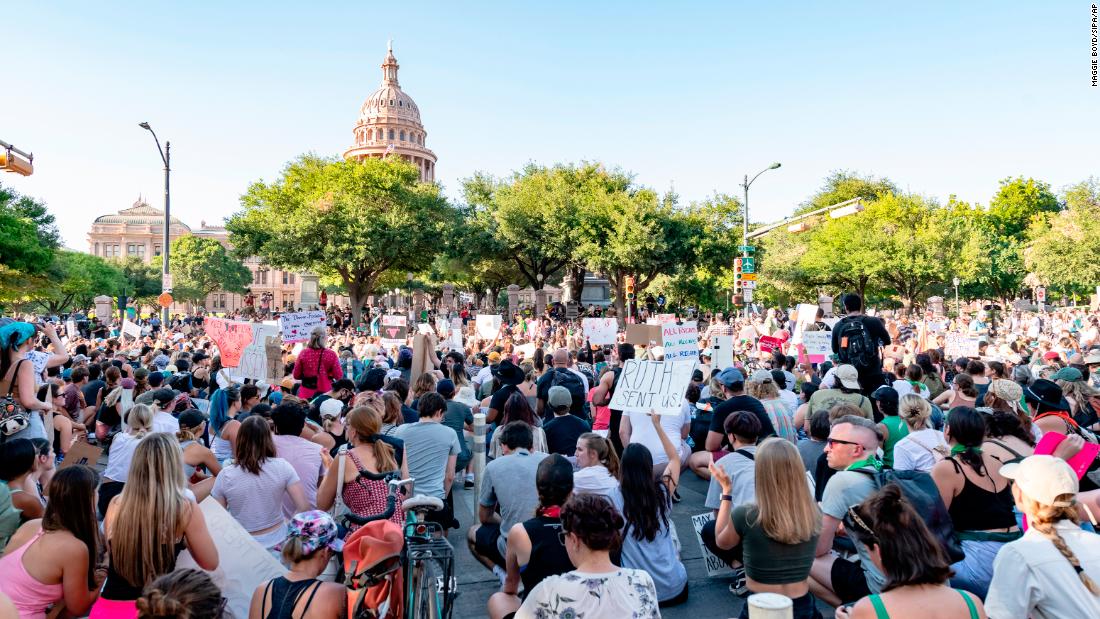

Abortion rights proponents have taken legal action, challenging several states’ abortion restrictions and have seen some success in temporarily blocking bans in at least five states: Idaho, Kentucky, Louisiana, Michigan and Utah.
Here’s where some states’ abortion bans stand as courts consider legal challenges:
Arizona’s Republican Attorney General Mark Brnovich is asking a state court to lift a 1973 court injunction against an abortion ban enacted in 1901.
In a filing Wednesday with the Arizona superior court in Pima County, Brnovich pointed to the US Supreme Court’s recent ruling in Dobbs v. Jackson Women’s Health, which ended federal constitutional protections for abortion rights.
“It is beyond dispute that Dobbs represents a change in the very law that was the sole and express basis for the Second Amended Final Judgment,” Brnovich wrote, referring to the 1973 injunction.
The fight over the pre-Roe abortion ban comes after Arizona federal Judge Douglas L. Rayes blocked a “personhood” provision in an existing abortion ban in the state, forbidding the state from using it to impose penalties for abortions that would otherwise be legal under existing Arizona law.
The injunction was granted following a motion filed by the Center for Reproductive Rights and the American Civil Liberties Union of Arizona.
Abortion rights advocates had worried that the state would use the language to prosecute providers or patients. “The personhood law classifies fetuses, embryos, and fertilized eggs as ‘people’ starting at the point of conception. The vague provision placed both providers and pregnant people at risk of arbitrary prosecution,” the ACLU of Arizona said in a news release Monday night.
Florida: state appealed, ban in effect
Idaho: ban temporarily blocked and another lawsuit filed
The Idaho Supreme Court is holding a hearing on August 3 to consider arguments on two abortion challenges.
Kentucky: ban temporarily blocked
Louisiana: ban temporarily blocked
Louisiana’s abortion trigger law is once again temporarily blocked from being enforced or implemented — this time by a different state court that had granted a temporary restraining order on July 12 against the law.
On July 8, a district court judge in New Orleans said that the challenge by abortion providers to the ban should be brought in Baton Rouge and lifted a temporary restraining order that had blocked the restrictive ban from taking effect, allowing the state to enforce its near-total ban on the procedure.
The Center for Reproductive Rights, one of the litigators in the case, asked the court in Baton Rouge to block the bans again. Tuesday’s order allows abortion services in the state to resume.
A hearing has been set for July 18 for the state to argue why a preliminary injunction should not be issued.
Michigan: ban temporarily blocked
Mississippi: appealed to state Supreme Court
Mississippi’s trigger law went into effect on July 7, after a Mississippi judge declined earlier in the week to temporarily block the ban. The trigger ban prohibits abortions in the state with exceptions only in cases of rape or if the pregnant person’s life is endangered. The state’s last abortion clinic, Jackson Women’s Health Organization, which challenged the trigger law, has appealed to the state Supreme Court.
North Dakota: lawsuit filed
North Dakota’s only abortion clinic, Red River Women’s Clinic, and its medical director sued on July 7 to block enforcement of the state’s trigger ban, which would ban abortion except in cases to save the life of a pregnant person. The lawsuit filed Thursday in state court argues that the trigger ban is unconstitutional under the North Dakota Constitution.
The ban is designed to take effect 30 days after the law is certified by the state attorney general to the legislative council. Attorney General Drew Wrigley wrote to the legislative council at the end of June, saying that the ban would take full effect on July 28.
Ohio: emergency hold denied
The Ohio Supreme Court denied state abortion providers’ request for an emergency hold on the state’s prohibition on abortions performed after fetal cardiac activity is detected, typically around six weeks into a pregnancy. The court’s ruling means the abortion ban can continue to be enforced as the case plays out.
Oklahoma: lawsuit filed
South Carolina: lawsuit filed
Abortion providers in South Carolina are challenging the state’s six-week abortion ban with a lawsuit filed in state court Wednesday.
The lawsuit alleges that the six-week prohibition violates several clauses of South Carolina’s Constitution. It also targets the design of the ban’s narrow exceptions for life of the mother, rape or incest. For instance, the lawsuit alleges that the rape exception runs afoul of the state constitution’s privacy protections because the exemption requires the provider report the abortion-seeker’s information to law enforcement.
The lawsuit was filed by Planned Parenthood South Atlantic and Greenville Women’s Clinic, as well as two individual providers. The providers filed with the lawsuit an emergency request for the court to quickly block the ban while the litigation plays out.
The six-week ban, passed by lawmakers in 2021, had been blocked by a federal court previously, however that hold was lifted after the US Supreme Court issued its ruling last month ending federal abortion rights protections, allowing for the ban’s revival.
Texas: pre-Roe abortion ban allowed to be civilly enforced
Utah: ban temporarily blocked
A Utah judge has continued an injunction blocking the state’s trigger law from taking effect, siding with Planned Parenthood in allowing the procedure to continue while the case plays out in the courts. Judge Andrew Stone in Salt Lake City’s 3rd District Court previously granted a two-week injunction in the case, preventing the trigger law from being enforced.
West Virginia: 19th century pre-Roe abortion ban blocked
A state court judge on July 18 indicated that she had decided to block a West Virginia abortion ban dating to the 1800s, according to news releases from both sides of the case.
The decision was announced from the bench, both sides confirmed. A copy of the order was not immediately available, a court clerk told CNN. West Virginia plans to appeal the decision.
“Today’s decision is a sigh of relief, and means we can once again serve the people who reach out to us for abortion services,” Katie Quiñonez, executive director of Women’s Health Center of West Virginia and one of the plaintiffs in the lawsuit, said in a statement.
Quiñonez, the clinic and other individual providers had asked for the preliminary injunction in a lawsuit filed in June, alleging the legislature implicitly repealed the law with the abortion regulations the lawmakers passed recently. The lawsuit, filed in Kanawha County Circuit Court, also claimed the ban violated the state constitution.
West Virginia’s Republican Attorney General Patrick Morrisey said the court’s decision to block the law was “a dark day for West Virginia.”
“We will appeal this decision to the Supreme Court of Appeals as soon as legally possible,” he said in a statement. “As a strong pro-life advocate, I am committed to protecting unborn babies to the fullest extent possible under the law, and I will not rest until this injunction is lifted.”
Wisconsin: lawsuit filed
Democratic state officials in Wisconsin have asked a state court to block Wisconsin’s pre-Roe abortion ban, which was allowed to take effect after the high court overturned the federal holding. The 1849 law criminalizes abortion in the state, including in cases of rape and incest.
The lawsuit asks a state court to “clarify that Wisconsin’s 19th century abortion ban with no exceptions for rape or incest has not gone back into effect,” and to deem it unenforceable.
This story has been updated with additional developments.
CNN’s Devan Cole, Chris Boyette,Tina Burnside, Amanda Musa and Alta Spells contributed to this report.
